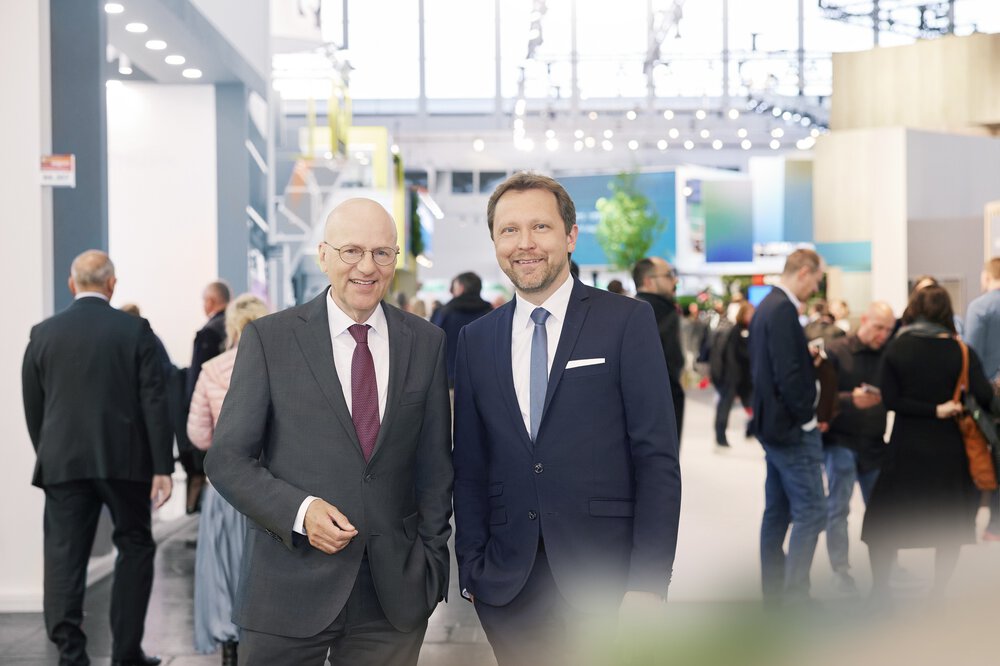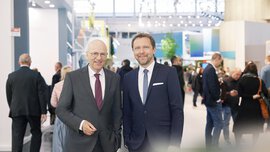Messe München exceeds all expectations in 2023: Higher income and fuller halls
December 14, 2023
- Sound finances and dept repayment
- More competitive: collaborations and new events
- Investing in sustainability: solar roof expansion and power boost
- Messe München heading into the future with confidence
After the experience of the coronavirus years, the Messe München planners had grown cautious and calculated the finances for 2023 accordingly. But then, trade fair and conference business in Munich unexpectedly made a resounding comeback. “Instead of the expected deficit, 2023 exceeds all expectations,” say co-CEOs Reinhard Pfeiffer and Stefan Rummel. Based on projections, sales grew by 45 million to 349.6 million euros, EBITDA (earnings before interest, taxes, depreciation and amortization) by 46 million to 62.6 million euros, and annual net income came out of the red by 47 million euros with a plus of 5.6 million euros. “Even despite difficult conditions in a regular year,” as the two CEOs explain. This will make it easier for the trade fair to invest, among other things, in a more powerful solar roof, sustainability, and digitalization.
“This is a great achievement by our trade fair team in Munich and abroad, and our many partners,” as both CEOs Reinhard Pfeiffer and Stefan Rummel point out: “We have set the right course.” Although not all events have yet reached the pre-Covid figures, a number of them did set new records, such as f.re.e, transport logistic and BAU.
As a result, Messe München will enter its anniversary year in 2024 full of confidence, as it turns 60, and as it prepares for a mega 2025, when almost all the major events such as BAU, bauma, transport logistic, productronica, automatica, EXPO REAL, and drinktec will take place.
Instead of an expected deficit, projections for 2023 show all the financial figures in the black: Sales amount to 349.6 million euros (up 45 million euros), while EBITDA (earnings before interest, taxes, depreciation and amortization) is up by 46 million euros to 62.6 million euros. And annual net income did not land in the red at 41 million euros, as feared, but with a plus of 5.6 million euros, hence 47 million euros above expectations. The reasons for this include lower costs due to the energy price brake, significantly higher income from trade fairs such as f.re.e, transport logistic, BAU, and EXPO REAL, or the sale of shares in the stand construction subsidiary meplan. “Our decision to concentrate on our core business is the right one,” as the co-CEOs Reinhard Pfeiffer and Stefan Rummel explain.
Messe München benefited from offering the right trade fairs at the right time in 2023, where exhibitors and visitors could discuss current pressing issues. The problems presently facing companies were reflected in the forums and conferences: whether at BAU or the EXPO REAL real estate trade fair (on inflation, energy prices, building freezes, or high interest rates), or at the electronics trade fairs such as productronica or automatica, which was held together with LASER World of PHOTONICS for the first time. Quantum technology was given a platform there, and the focus was also on artificial intelligence, supply chain problems, and the shortage of skilled workers.
The growing share of foreign exhibitors compared to pre-pandemic times is striking. In Munich, the figure rose by three percent to 54 percent (around 8,800) compared to previous events. The increase makes up for the fact that German companies are returning somewhat more hesitantly in this economically tense situation; this is a nationwide trend.
Investing in a more powerful photovoltaic rooftop system
The positive financial situation makes it easier for Messe München to invest. One focus is on sustainability, with Messe München setting itself an ambitious goal: Its aim is to be carbon neutral by 2030. On step along the way is the expansion of the photovoltaic rooftop system: When the exhibition grounds in Riem opened in 1998, Messe München already had the world’s largest solar roof system. It will now take over the photovoltaic system on the Parkhaus West parking facility, previously operated by investors, and renovate it. The system there will then be able to generate up to 2.6 million kilowatt hours of electricity annually – instead of 600,000 today. That will in total increase the amount of power generated on the roofs of the trade fair from the current 2.6 million kilowatt hours to 4.5 million. Cost: 9 million euros.
One major energy-saving project is the conversion of all 18 halls (covering an area of 200,000 square meters) to energy-saving LED lighting by 2026. Cost: 8.5 million euros. The annual electricity bill will be 540,000 euros lower as a result. Both projects together can save electricity costs of 1.2 million euros per year.
More effective through collaborations
Messe München doesn’t stand still and has to react to changing conditions. That also includes looking for strategic partners. “We are collaborating in order to remain competitive and become more effective,” as the two CEOs Reinhard Pfeiffer and Stefan Rummel explain. Two projects stand out this year. One is a Bavarian alliance, a joint venture between the world’s leading trade fair drinktec in Munich and the leading European trade fair BrauBeviale in Nuremberg under one roof as “Yontex”. It will turn competitors from similar sectors into partners who can now have a stronger presence together worldwide.
The second project concerns Messe München’s subsidiary meplan, a specialist in exhibition stand construction. mac. brand spaces, an international company specializing in live communication, has acquired 50 percent of the shares. “This will increase meplan’s reach and secure its future,” say the trade fair CEOs. meplan and its 90 employees will remain in Munich.
Lively trade fair and conference business
2023 was a regular trade fair year for Messe München without many major events. There were 112 events in Munich’s exhibition halls, at the ICM – International Congress Center Messe München, and at the MOC – Event Center Messe München: 13 own trade fairs and 99 guest events, which attracted two million visitors and 32,100 exhibitors. The 40 own events abroad attracted around 809,000 visitors and 15,000 exhibitors. Most of the events abroad were in China, India, and Singapore. In the electronics sector, the trade fairs abroad drew large crowds. In terms of size and the number of exhibitors and visitors, they were on a par with the parent trade fair in Munich. electronica China covered 107,000 square meters and attracted 90,000 visitors. With 37,000 square meters and 40,000 visitors, electronica and productronica India was India’s largest trade fair in halls.
Visitor and exhibitor numbers are approaching pre-Covid levels again. In some cases, they were even better at events in Munich and abroad. The fact that China lifted its coronavirus restrictions in 2023 is making itself felt. More visitors than before the coronavirus pandemic came to f.re.e in Munich. Together with IMOT, being held in parallel, it was literally stormed by 163,000 guests. More visitors than before the pandemic came to transport logistic (which set a new record with 76,000 visitors) and also to LASER World of PHOTONICS. BAU and LOPEC registered the biggest increase in the number of exhibitors in Munich. “The smarter E Europe” stands out among the guest events. It has extended its contract by five years and will occupy all 18 exhibition halls in 2024. The world’s brightest spotlight fell in September on IAA Mobility. It became an open platform for supporters and opponents in the middle of the city. Planning is underway for an IAA Mobility 2025 in Munich.
Great appeal for international guest events
The circa 90 guest events each year are of great importance to Messe München’s core business. Two new events have been added this year, which will take place in Munich for the first time in 2024: The first is the International AIDS Conference, which is expected to attract around 15,000 participants. The second new addition is Seamless Europe, one of the world’s leading technology trade fairs for fintech and e-commerce. It’s a real sensation for Munich as a center for finance and commerce.
Opening up new markets internationally
Foreign business is an important mainstay for Messe München. Here, too, the 2023 events are performing well above plan. China and India are far exceeding expectations. China is and remains the most important event market for Messe München after Munich. In China, Messe München is represented with 22 events at seven locations, and in India with 18 trade fairs in five cities. A new addition is Singapore, the gateway to Southeast Asia. Messe München organized the first multimodal logistics trade fair in Singapore in 2023 with transport logistic and air cargo Southeast Asia: the world’s leading trade fair transport logistic at the world champion in logistics, Singapore. “We will continue to develop abroad and open up new markets,” as Reinhard Pfeiffer and Stefan Rummel explain.
Young at heart at 60: Messe München celebrates its anniversary in 2024
The outstanding results of the past two years have put Messe München in a celebratory mood: LASER turned 50 this year. And in 2024, there will be three 60th anniversaries: Messe München will turn 60, as will electronica and BAU. And 2025 will be a mega year with all the major trade fairs taking place, once again attracting millions of visitors. That only happens every twelve years, and Munich and the entire region are very happy about it, since trade fairs generate indirect profitability of more than four billion euros in years like these. “With our trade fairs, we are an important economic driver for the entire region,” say the two CEOs Reinhard Pfeiffer and Stefan Rummel. The latest accommodation statistics for Munich show that Munich’s trade fairs and guest events generate the most money for hotels.
Belonging images















- Spokesman
